rt-thread audio框架移植stm32 adc+dac,用wavplayer录音和播放
D1 参考
rt-thread官方sdk中,正点原子stm32f429-atk-appollo的board中有audio文件夹,包括了mic/play的程序,wm8978的库文件

因为我们基于stm32h750内置adc+dac设计,所以不需要wm8978.c/h。只需要移植drv_sound.c和drv_mic.c
D2 工程名字和路径
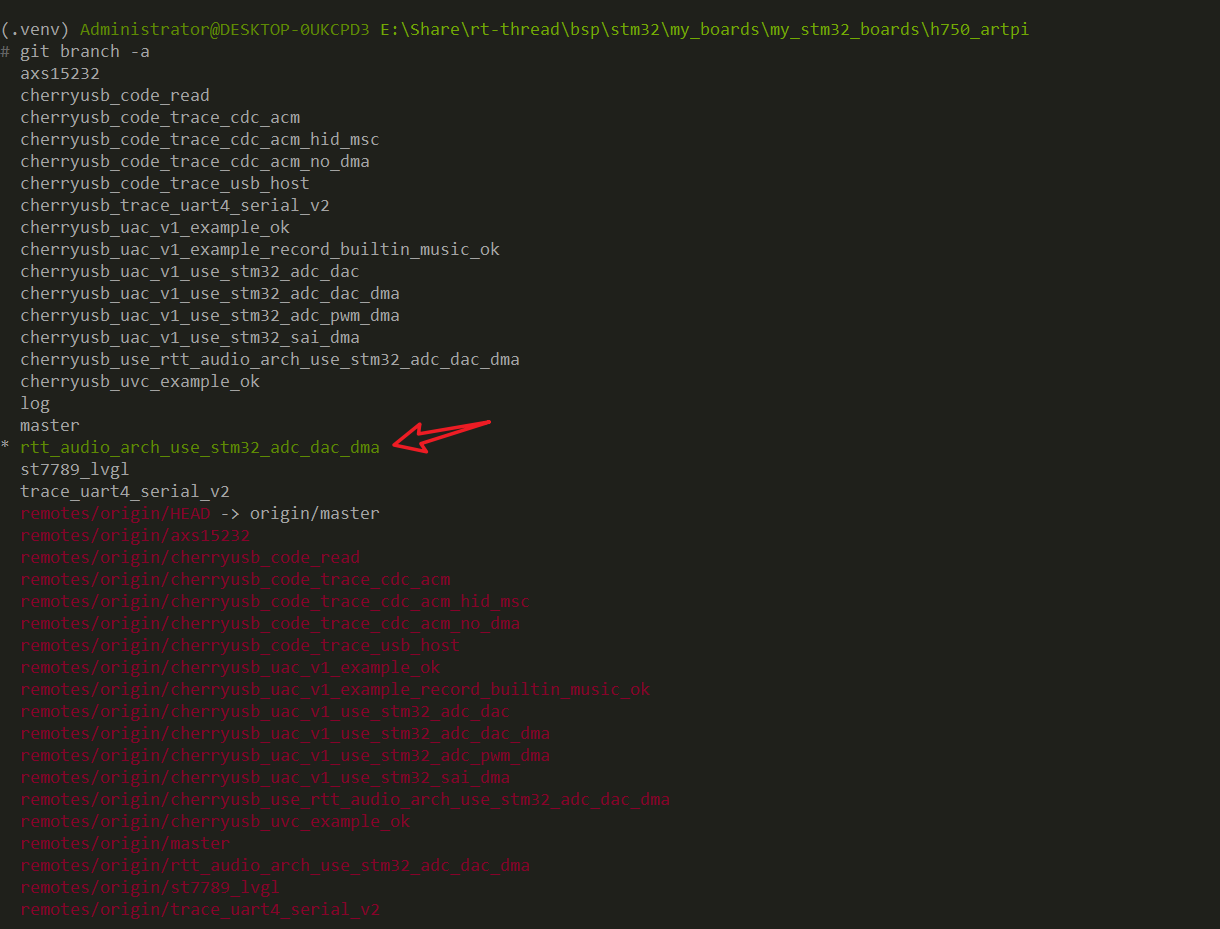
D3 drv_sound.c所作修改简单说明
- 定义了一个正弦波用于测试,注意范围是0-4095
- 定义了一个Nocache buffer for DMA,这个非常重要。我在这里最初没有使用Nocache buffer,折腾了很久,声音异常。
- 这些参数的定义,来自CubeMX裸机例程。因此先把CubMX裸机例程调通,非常重要。
/****************************************************************************
* @brief 与cubeMX硬件初始化相关的变量定义
****************************************************************************/
#define USB_NOCACHE_RAM_SECTION __attribute__((section(".noncacheable")))
#define USB_MEM_ALIGNX __attribute__((aligned(32)))DAC_HandleTypeDef hdac1;
DMA_HandleTypeDef hdma_dac1_ch2;TIM_HandleTypeDef htim2;#define TONE_FREQ (440)
#define SIN_TABLE_SIZE (16000 / TONE_FREQ) /*16kHz/440Hz=36 pts*/
#define M_PI 3.14159265358979323846
uint16_t sin_table[SIN_TABLE_SIZE];USB_NOCACHE_RAM_SECTION USB_MEM_ALIGNX uint8_t dac_buffer[TX_DMA_FIFO_SIZE]; // Nocache buffer for DMA, important!// static void MX_ADC1_Init(void);
static void MX_DAC1_Init(void);
static void MX_TIM2_Init(void);
static void MX_DMA_Init(void);static void generate_sin_table(void)
{for (int i = 0; i < SIN_TABLE_SIZE; i++){float angle = 2 * M_PI * i / SIN_TABLE_SIZE;sin_table[i] = (uint16_t)((sin(angle) + 1.0f) * 2047.5f); // 12-bit DAC, 0-4095 range}
}
- 播放要实现的几个dev_audio设备驱动框架的几个函数包括:stm32_player_getcaps,stm32_player_configure, stm32_player_init, stm32_player_start, stm32_player_stop, stm32_player_buffer_info
- 只有stm32_player_init, stm32_player_start是必须需要用户要实现的。 stm32_player_buffer_info也是要实现的,不过很简单,基本不用改。
- 如果配置是CubeMX产生的,而且是固定的,那么stm32_player_getcaps,stm32_player_configure可以不用实现,直接返回RET_OK即可。
- 对于本文,因为我们默认配置rt-thread的软件库wavplayer使用,wavplayer定义了AUDIO_TYPE_OUTPUT–>AUDIO_DSP_PARAM参数配置,因此我们在stm32_player_configure中实现了这个操作方法。主要是用来配置采样率。因为不同的音频,采样率不同。
- 另外,因为音频驱动框架默认使用DMA模式,因此需要在传输完成和半传输完成中调用rt_audio_tx_complete,用于申请切换缓冲区
/****************************************************************************
* @brief 要实现的几个dev_audio接口函数
****************************************************************************/
void HAL_DACEx_ConvHalfCpltCallbackCh2(DAC_HandleTypeDef* hdac)
{if (hdac->Instance == DAC1){rt_audio_tx_complete(&_stm32_audio_play.audio);}
}void HAL_DACEx_ConvCpltCallbackCh2(DAC_HandleTypeDef* hdac)
{if (hdac->Instance == DAC1){rt_audio_tx_complete(&_stm32_audio_play.audio);}
}static rt_err_t stm32_player_getcaps(struct rt_audio_device *audio, struct rt_audio_caps *caps)
{rt_err_t result = RT_EOK;struct stm32_audio *st_audio = (struct stm32_audio *)audio->parent.user_data;LOG_D("%s:main_type: %d, sub_type: %d", __FUNCTION__, caps->main_type, caps->sub_type);return result;
}static rt_err_t stm32_player_configure(struct rt_audio_device *audio, struct rt_audio_caps *caps)
{rt_err_t result = RT_EOK;struct stm32_audio *st_audio = (struct stm32_audio *)audio->parent.user_data;LOG_D("%s:main_type: %d, sub_type: %d", __FUNCTION__, caps->main_type, caps->sub_type);switch (caps->main_type){case AUDIO_TYPE_MIXER:{switch (caps->sub_type){case AUDIO_MIXER_VOLUME:{int volume = caps->udata.value;st_audio->replay_volume = volume;break;}default:result = -RT_ERROR;break;}break;}case AUDIO_TYPE_OUTPUT:{switch (caps->sub_type){case AUDIO_DSP_PARAM:{struct rt_audio_configure config = caps->udata.config;st_audio->replay_config.samplerate = config.samplerate;st_audio->replay_config.samplebits = config.samplebits;st_audio->replay_config.channels = config.channels;/*只添加调整采样率的功能*/__HAL_TIM_SET_AUTORELOAD(&htim2, 240000000 / st_audio->replay_config.samplerate - 1);rt_kprintf("samplerate: %d\n", st_audio->replay_config.samplerate);rt_kprintf("samplebits: %d\n", st_audio->replay_config.samplebits);rt_kprintf("channels: %d\n", st_audio->replay_config.channels);break;}default:result = -RT_ERROR;break;}break;}default:break;}return result;
}static rt_err_t stm32_player_init(struct rt_audio_device *audio)
{MX_DMA_Init();MX_DAC1_Init();MX_TIM2_Init();return RT_EOK;
}static rt_err_t stm32_player_start(struct rt_audio_device *audio, int stream)
{if (stream == AUDIO_STREAM_REPLAY){HAL_TIM_Base_Start(&htim2);HAL_DAC_Start_DMA(&hdac1, DAC_CHANNEL_2, (uint32_t *) _stm32_audio_play.tx_fifo, TX_DMA_FIFO_SIZE / 2, DAC_ALIGN_12B_R);}return RT_EOK;
}static rt_err_t stm32_player_stop(struct rt_audio_device *audio, int stream)
{if (stream == AUDIO_STREAM_REPLAY){HAL_DAC_Stop_DMA(&hdac1, DAC_CHANNEL_2);HAL_TIM_Base_Stop(&htim2);}return RT_EOK;
}static void stm32_player_buffer_info(struct rt_audio_device *audio, struct rt_audio_buf_info *info)
{/*** TX_FIFO* +----------------+----------------+* | block1 | block2 |* +----------------+----------------+* \ block_size /*/info->buffer = _stm32_audio_play.tx_fifo;info->total_size = TX_DMA_FIFO_SIZE;info->block_size = TX_DMA_FIFO_SIZE / 2;info->block_count = 2;
}
static struct rt_audio_ops _p_audio_ops =
{.getcaps = stm32_player_getcaps,.configure = stm32_player_configure,.init = stm32_player_init,.start = stm32_player_start,.stop = stm32_player_stop,.transmit = RT_NULL,.buffer_info = stm32_player_buffer_info,
};int rt_hw_sound_init(void)
{rt_uint8_t *tx_fifo;/* player */tx_fifo = /*rt_malloc(TX_DMA_FIFO_SIZE)*/ dac_buffer; /*替换为nocache的dac_buffer, 非常重要! 折腾了几个小时!*/if (tx_fifo == RT_NULL){return -RT_ENOMEM;}rt_memset(tx_fifo, 0, TX_DMA_FIFO_SIZE);_stm32_audio_play.tx_fifo = tx_fifo;/* register sound device */_stm32_audio_play.audio.ops = &_p_audio_ops;rt_audio_register(&_stm32_audio_play.audio, "sound0", RT_DEVICE_FLAG_WRONLY, &_stm32_audio_play);return RT_EOK;
}INIT_DEVICE_EXPORT(rt_hw_sound_init);
- 接下来定义了一个播放线程,用于播放前面定义的sine信号,输出440Hz钢琴标准音。
- 在线程函数play_thread_entry循环体中,只需要调用rt_device_write不停的write即可。这个函数自带阻塞性质,因此不需要额外添加rt_thread_mdelay(也必须不能添加,否则有声音断断续续)
- 通过MSH_CMD_EXPORT导出到msh中执行,方便测试
/****************************************************************************
* @brief 测试播放sin信号线程, 导入到msh
****************************************************************************/
void play_thread_entry(void *parameter)
{rt_device_t sound_dev;rt_size_t written;generate_sin_table();sound_dev = rt_device_find("sound0");rt_device_open(sound_dev, RT_DEVICE_OFLAG_WRONLY);while(1){written = rt_device_write(sound_dev, 0, sin_table, sizeof(sin_table));// rt_kprintf("Wrote %d bytes to sound device\n", written);// rt_thread_mdelay(1);}
}void play_sine()
{rt_thread_t thread;thread = rt_thread_create("play_thread", play_thread_entry, RT_NULL, 2048, 2, 10);if (thread != RT_NULL){rt_thread_startup(thread);}
}
MSH_CMD_EXPORT(play_sine, play_sine_test);
- 接下来的部分是硬件初始化函数部分。主要包括 CubeMX底层硬件初始化, 包括xx_MSPInit(), xx_Init(), xx_IRQHandler()。
- 直接从CubeMX生成工程拷贝过来的,不再赘述了。这部分的内容,之前已经在rt-thread中经过测试的,是可以正常工作的。
- 注意我们TIM2配置的period频率是16kHz,这是默认值。可以通过stm32_player_configure修改。
D4 drv_mic.c所作修改简单说明
- 定义了一个Nocache buffer for DMA,这个非常重要。我在这里最初没有使用Nocache buffer,折腾了很久,录音声音异常。
- 这些参数的定义,来自CubeMX裸机例程。因此先把CubMX裸机例程调通,非常重要。
/****************************************************************************
* @brief 与cubeMX硬件初始化相关的变量定义
****************************************************************************/
#define USB_NOCACHE_RAM_SECTION __attribute__((section(".noncacheable")))
#define USB_MEM_ALIGNX __attribute__((aligned(32)))ADC_HandleTypeDef hadc1;
DMA_HandleTypeDef hdma_adc1;extern TIM_HandleTypeDef htim2;USB_NOCACHE_RAM_SECTION USB_MEM_ALIGNX uint8_t adc_buffer[RX_DMA_FIFO_SIZE]; // Nocache buffer for DMA, important!static void MX_ADC1_Init(void);
static void MX_TIM2_Init(void);
static void MX_DMA_Init(void);
- 录音要实现的几个dev_audio设备驱动框架的几个函数包括:stm32_mic_getcaps,stm32_mic_configure, stm32_mic_init, stm32_mic_start, stm32_mic_stop, stm32_mic_buffer_info
- 只有stm32_mic_init, stm32_mic_start是必须需要用户要实现的。
- 如果配置是CubeMX产生的,而且是固定的,那么stm32_mic_getcaps,stm32_mic_configure可以不用实现,直接返回RET_OK即可。
- 对于本文,因为我们默认配置rt-thread的软件库wavplayer使用,wavplayer定义了AUDIO_TYPE_INPUT–>AUDIO_DSP_PARAM参数配置,因此我们在stm32_mic_configure中实现了这个操作方法。主要是用来配置采样率。
- 另外,因为音频驱动框架默认使用DMA模式,因此需要在传输完成和半传输完成中调用rt_audio_rx_done,用于申请切换缓冲区
/****************************************************************************
* @brief 要实现的几个dev_audio接口函数
****************************************************************************/
void HAL_ADC_ConvHalfCpltCallback(ADC_HandleTypeDef* hadc)
{if (hadc->Instance == ADC1){rt_audio_rx_done(&(_stm32_audio_record.audio), &_stm32_audio_record.rx_fifo[RX_DMA_FIFO_SIZE / 2], RX_DMA_FIFO_SIZE / 2);}
}void HAL_ADC_ConvCpltCallback(ADC_HandleTypeDef* hadc)
{if (hadc->Instance == ADC1){rt_audio_rx_done(&(_stm32_audio_record.audio), &_stm32_audio_record.rx_fifo[0], RX_DMA_FIFO_SIZE / 2);}
}static rt_err_t stm32_mic_getcaps(struct rt_audio_device *audio, struct rt_audio_caps *caps)
{rt_err_t result = RT_EOK;LOG_D("%s:main_type: %d, sub_type: %d", __FUNCTION__, caps->main_type, caps->sub_type);return result;
}static rt_err_t stm32_mic_configure(struct rt_audio_device *audio, struct rt_audio_caps *caps)
{rt_err_t result = RT_EOK;LOG_D("%s:main_type: %d, sub_type: %d", __FUNCTION__, caps->main_type, caps->sub_type);switch (caps->main_type){case AUDIO_TYPE_INPUT:{switch (caps->sub_type){case AUDIO_DSP_PARAM:{_stm32_audio_record.config.samplerate = caps->udata.config.samplerate;_stm32_audio_record.config.channels = caps->udata.config.channels;_stm32_audio_record.config.samplebits = caps->udata.config.samplebits;/*只添加调整采样率的功能*/__HAL_TIM_SET_AUTORELOAD(&htim2, 240000000 / _stm32_audio_record.config.samplerate - 1);rt_kprintf("samplerate: %d\n", _stm32_audio_record.config.samplerate);rt_kprintf("samplebits: %d\n", _stm32_audio_record.config.samplebits);rt_kprintf("channels: %d\n", _stm32_audio_record.config.channels);break;}default:result = -RT_ERROR;break;}/* After set config, MCLK will stop */break;}default:break;}return result;
}static rt_err_t stm32_mic_init(struct rt_audio_device *audio)
{MX_DMA_Init();MX_ADC1_Init();MX_TIM2_Init();return RT_EOK;
}static rt_err_t stm32_mic_start(struct rt_audio_device *audio, int stream)
{rt_err_t result = RT_EOK;if (stream == AUDIO_STREAM_RECORD){HAL_TIM_Base_Start(&htim2);HAL_ADC_Start_DMA(&hadc1, (uint32_t *) _stm32_audio_record.rx_fifo, RX_DMA_FIFO_SIZE/2);}return result;
}static rt_err_t stm32_mic_stop(struct rt_audio_device *audio, int stream)
{if (stream == AUDIO_STREAM_RECORD){HAL_ADC_Stop_DMA(&hadc1);HAL_TIM_Base_Stop(&htim2);}return RT_EOK;
}static struct rt_audio_ops _mic_audio_ops =
{.getcaps = stm32_mic_getcaps,.configure = stm32_mic_configure,.init = stm32_mic_init,.start = stm32_mic_start,.stop = stm32_mic_stop,.transmit = RT_NULL,.buffer_info = RT_NULL,
};int rt_hw_mic_init(void)
{struct rt_audio_device *audio = &_stm32_audio_record.audio;/* mic default */_stm32_audio_record.rx_fifo = /*rt_calloc(1, RX_DMA_FIFO_SIZE)*/ adc_buffer; /*替换为nocache的adc_buffer, 非常重要! 折腾了几个小时!*/if (_stm32_audio_record.rx_fifo == RT_NULL){return -RT_ENOMEM;}_stm32_audio_record.config.channels = 1;_stm32_audio_record.config.samplerate = 16000;_stm32_audio_record.config.samplebits = 16;/* register mic device */audio->ops = &_mic_audio_ops;rt_audio_register(audio, "mic0", RT_DEVICE_FLAG_RDONLY, &_stm32_audio_record);return RT_EOK;
}INIT_DEVICE_EXPORT(rt_hw_mic_init);
- 我们没有定义录音线程。我们直接使用wavplayer进行录音测试。
- 接下来的部分是硬件初始化函数部分。主要包括 CubeMX底层硬件初始化, 包括xx_MSPInit(), xx_Init(), xx_IRQHandler()。
- 直接从CubeMX生成工程拷贝过来的,不再赘述了。这部分的内容,之前已经在rt-thread中经过测试的,是可以正常工作的。
- 注意我们TIM2配置的period频率是16kHz,这是默认值。可以通过stm32_mic_configure修改。
- 注意TIM2的MSPInit()函数,定义在drv_sound.c中,因为2个音频设备都使用了TIM2, 这个函数是全局的,只能定义在一个地方。
D5 Menuconfig配置
-
需要开启rt-thread的audio设备
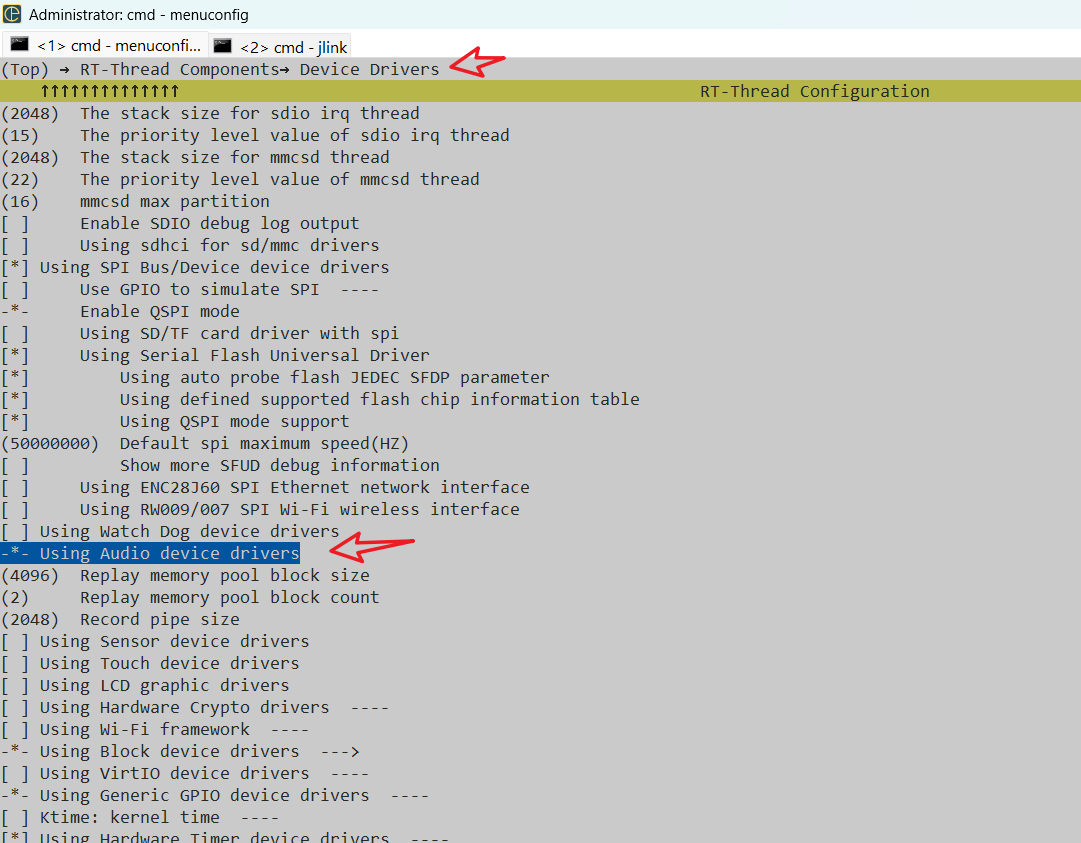
-
需要开启rt-thread的online多媒体插件wavplayer
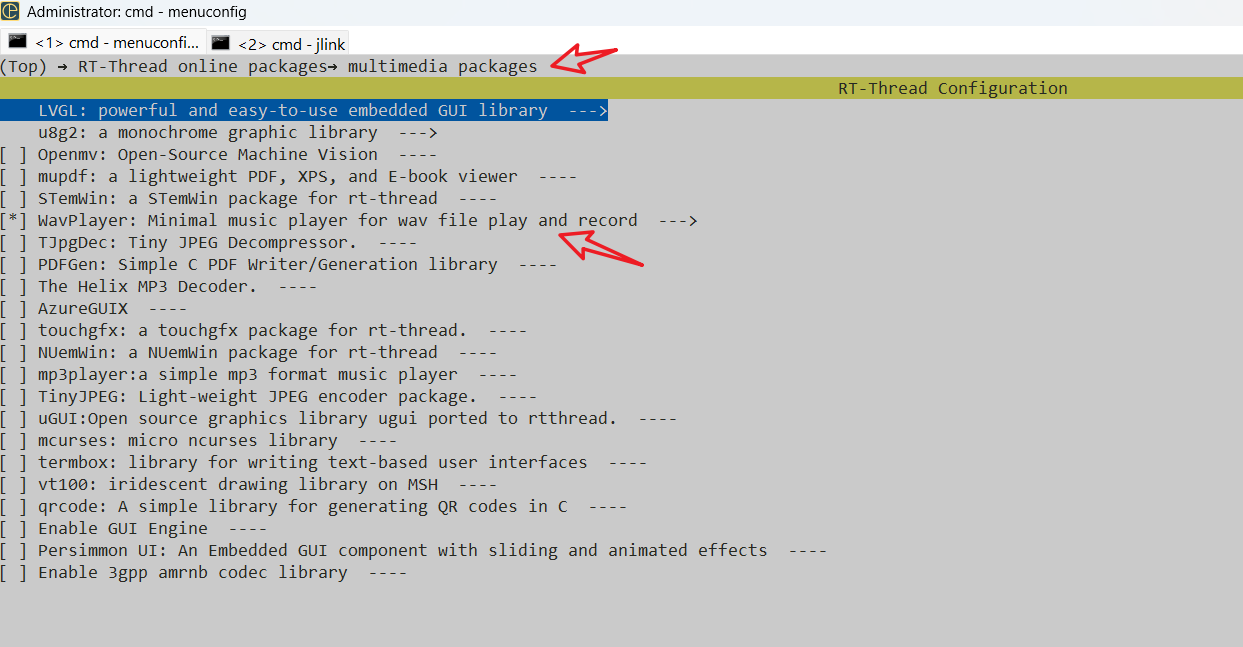
-
wavplayer默认开启了播放。录音需要开启, 并设置设备名字为"mic0"

-
还需要勾选cherryusb设备msc class, 因为我们要用ramdisk作为msc设备。便于从pc上拷贝wav文件到ramdisk。
D6 程序在工程中的位置
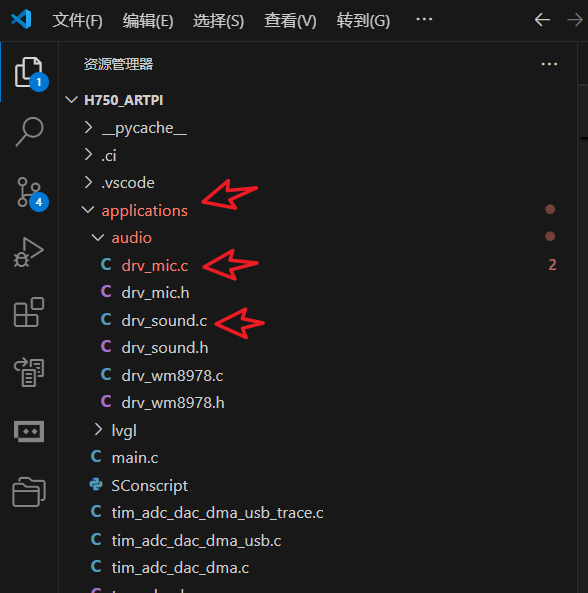
D7 cherryusb_msc开启
E:\Share\rt-thread\bsp\stm32\my_boards\my_stm32_boards\h750_artpi\board\port2\msc_blkdev_template.c
// #define BLOCK_DEVICE_NAME "W25Q64S"
#define BLOCK_DEVICE_NAME "ramdisk0"
// #define BLOCK_DEVICE_NAME "sd0"
D8 wavplayer的修改
- wavplayer_cmd.c的bug修改, wavplay_args_prase函数中调用optparse_init()函数少了一个参数argc
/* Parse cmd */optparse_init(&options, argc, argv);
- wavrecorder_cmd.c的bug修改, wavrecord_args_prase函数中调用optparse_init()函数少了一个参数argc
/* Parse cmd */optparse_init(&options, argc, argv);
- wavplayer.c中wavplayer_entry函数修改, 因为要适配DAC需要使用12bits unsigned int,wav原始数据是16bits signed,需要转换。
case PLAYER_EVENT_NONE:{/* read raw data from file stream */size = fread(player.buffer, WP_BUFFER_SIZE, 1, player.fp);if (size != 1){/* FILE END*/player.state = PLAYER_STATE_STOPED;}else{int16_t *p = (int16_t *)player.buffer;for(int i=0; i < WP_BUFFER_SIZE/2; i++){ /*Add by xujc, for 12bits DAC play*/p[i] += 32768;p[i] >>= 4;}/*witte data to sound device*/rt_device_write(player.device, 0, player.buffer, WP_BUFFER_SIZE);}break;}
- wavrecorder.c中wavrecord_entry函数修改, 因为要适配ADC需要使用16bits unsigned,wav原始数据是16bits signed,需要转换。
/* read raw data from sound device */size = rt_device_read(record.device, 0, record.buffer, WR_BUFFER_SIZE);if (size){int16_t *buffer = (int16_t *)record.buffer;for(int i = 0; i < size/2; i++) {buffer[i] = (int16_t)(((uint16_t *)record.buffer)[i] - 32768);}fwrite(record.buffer, size, 1, record.fp);total_length += size;}
D9 测试
- play_sine测试ok
msh />help
RT-Thread shell commands:
play_sine - play_sine_test
sdram_test - sdram test
reboot - Reboot System
ramdisk - create ramdisk device.
wavplay - play wav music
wavrecord - record wav music
usbh_init - init usb host
usbh_deinit - deinit usb host
lsusb - ls usb devices
fal - FAL (Flash Abstraction Layer) operate.
list_blk - dump all of blks information
adc - adc [option]
dac - dac function
pin - pin [option]
sf - SPI Flash operate.
clear - clear the terminal screen
version - show RT-Thread version information
list - list objects
help - RT-Thread shell help
ps - List threads in the system
free - Show the memory usage in the system
ls - List information about the FILEs.
cp - Copy SOURCE to DEST.
mv - Rename SOURCE to DEST.
cat - Concatenate FILE(s)
rm - Remove(unlink) the FILE(s).
cd - Change the shell working directory.
pwd - Print the name of the current working directory.
mkdir - Create the DIRECTORY.
mkfs - format disk with file system
mount - mount <device> <mountpoint> <fstype>
umount - Unmount the mountpoint
df - disk free
echo - echo string to file
tail - print the last N - lines data of the given file
backtrace - print backtrace of a threadmsh />play_sine
-
播放wavplayer自带的3个example wav文件(这个非常不错,自带wav,省得去找)

-
将3个wav文件拷贝到ramdisk msc u盘中
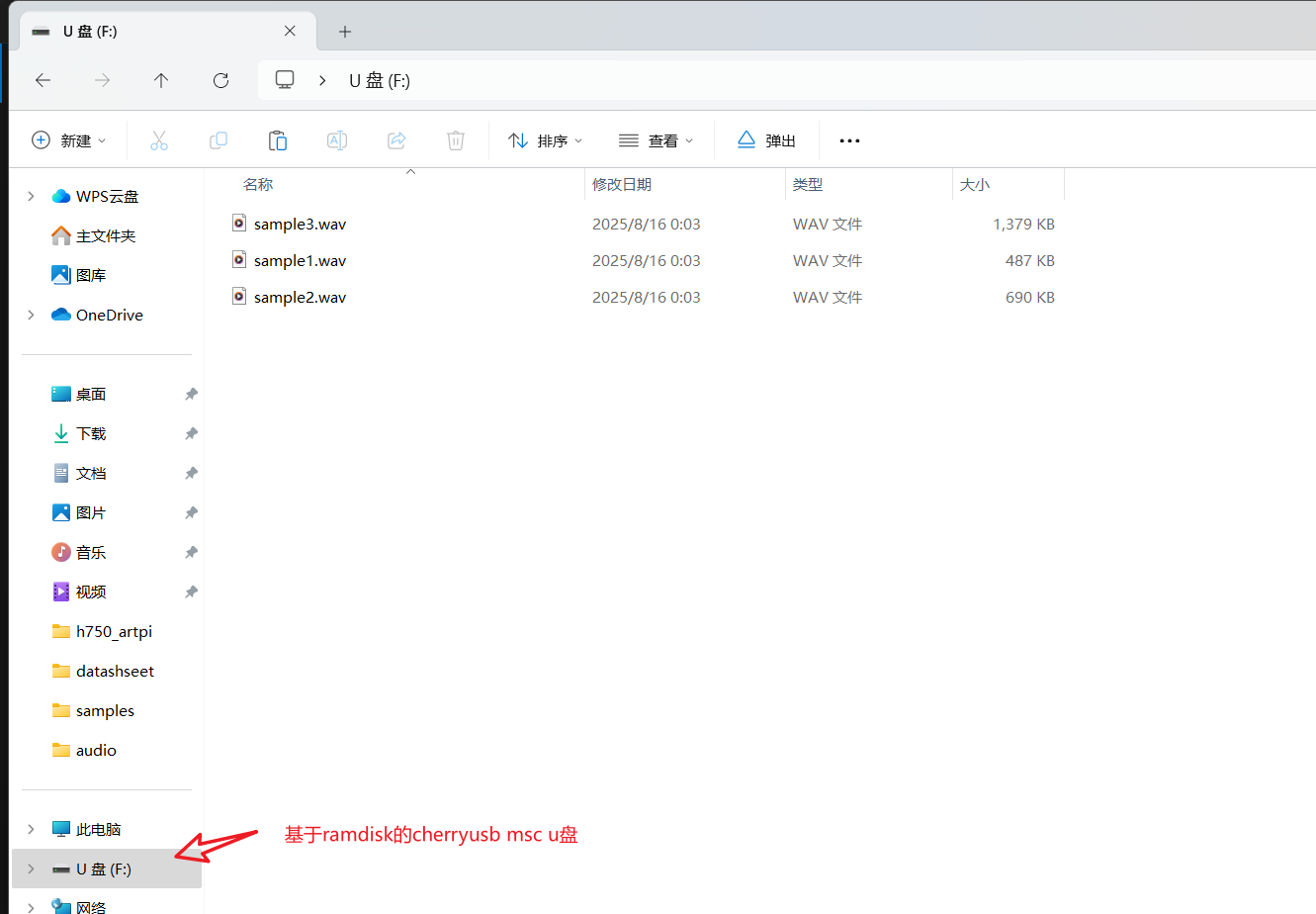
-
用wavplay命令来播放wav文件,效果非常不错。
msh />ls ramdisk
Directory ramdisk:
System Volume Inform<DIR>
sample3.wav 1411248
sample1.wav 497904
sample2.wav 705644
msh />wavplay -h
usage: wavplay [option] [target] ...usage options:-h, --help Print defined help message.-s URI, --start=URI Play wav music with URI(local files).-t, --stop Stop playing music.-p, --pause Pause the music.-r, --resume Resume the music.-v lvl, --volume=lvl Change the volume(0~99).-d, --dump Dump play relevant information.
msh />wavplay -s ramdisk/sample1.wav
samplerate: 44100
samplebits: 16
channels: 2
[I/WAV_PLAYER] play start, uri=ramdisk/sample1.wav
msh />[I/WAV_PLAYER] play endmsh />wavplay -s ramdisk/sample2.wav
samplerate: 44100
samplebits: 16
channels: 2
[I/WAV_PLAYER] play start, uri=ramdisk/sample2.wav
msh />[I/WAV_PLAYER] play endmsh />wavplay -s ramdisk/sample3.wav
samplerate: 44100
samplebits: 16
channels: 2
[I/WAV_PLAYER] play start, uri=ramdisk/sample3.wav
msh />[I/WAV_PLAYER] play end- 录音和播放测试
- 我说一段话,然后用wavrecord录音,以16kHz录音,录音文件保存在ramdisk中
- 用wavplay命令来播放录音文件,效果非常不错。
msh />wavrecord
usage: wavrecord [option] [target] ...usage options:-h, --help Print defined help message.-s file --start=file <samplerate> <channels> <samplebits>record wav music to filesystem.-t, --stop Stop record.
msh />wavrecord -s ramdisk/my.wav 16000 1 16
Information:
samplerate 16000
channels 1
samplerate: 16000
samplebits: 16
channels: 1
msh />wavrecord -t
msh />ls ramdisk
Directory ramdisk:
System Volume Inform<DIR>
sample3.wav 1411248
sample1.wav 497904
sample2.wav 705644
my.wav 311340
msh />wavplay -s ramdisk/my.wav
samplerate: 16000
samplebits: 16
channels: 1
[I/WAV_PLAYER] play start, uri=ramdisk/my.wav
msh />[I/WAV_PLAYER] play end- 电脑打开抖音,播放一段仙剑奇侠传主题曲《此生不换》
- 开启wavrecord录音, 这次以44100采样率录制,音质较高, 录音时间较长,文件较大
- 用wavplay命令来播放录音文件,效果非常不错。
msh />wavrecord -s ramdisk/my2.wav 44100 1 16
Information:
samplerate 44100
channels 1
samplerate: 44100
samplebits: 16
channels: 1
msh />wavrecord -t
msh />ls ramdisk
Directory ramdisk:
System Volume Inform<DIR>
sample3.wav 1411248
sample1.wav 497904
sample2.wav 705644
my.wav 311340
my2.wav 5419008
msh />wavplay -s ramdisk/my2.wav
samplerate: 44100
samplebits: 16
channels: 1
[I/WAV_PLAYER] play start, uri=ramdisk/my2.wavD10 附录1:drv_sound.c
/** Copyright (c) 2006-2021, RT-Thread Development Team** SPDX-License-Identifier: Apache-2.0** Change Logs:* Date Author Notes* 2019-07-28 Ernest the first version*/#include "board.h"
#include "drv_sound.h"#define DBG_TAG "drv.sound"
#define DBG_LVL DBG_INFO
#include <rtdbg.h>#define TX_DMA_FIFO_SIZE (2048)struct stm32_audio
{struct rt_audio_device audio;struct rt_audio_configure replay_config;int replay_volume;rt_uint8_t *tx_fifo;rt_bool_t startup;
};
struct stm32_audio _stm32_audio_play = {0};/****************************************************************************
* @brief 与cubeMX硬件初始化相关的变量定义
****************************************************************************/
#define USB_NOCACHE_RAM_SECTION __attribute__((section(".noncacheable")))
#define USB_MEM_ALIGNX __attribute__((aligned(32)))DAC_HandleTypeDef hdac1;
DMA_HandleTypeDef hdma_dac1_ch2;TIM_HandleTypeDef htim2;#define TONE_FREQ (440)
#define SIN_TABLE_SIZE (16000 / TONE_FREQ) /*16kHz/440Hz=36 pts*/
#define M_PI 3.14159265358979323846
uint16_t sin_table[SIN_TABLE_SIZE];USB_NOCACHE_RAM_SECTION USB_MEM_ALIGNX uint8_t dac_buffer[TX_DMA_FIFO_SIZE]; // Nocache buffer for DMA, important!// static void MX_ADC1_Init(void);
static void MX_DAC1_Init(void);
static void MX_TIM2_Init(void);
static void MX_DMA_Init(void);static void generate_sin_table(void)
{for (int i = 0; i < SIN_TABLE_SIZE; i++){float angle = 2 * M_PI * i / SIN_TABLE_SIZE;sin_table[i] = (uint16_t)((sin(angle) + 1.0f) * 2047.5f); // 12-bit DAC, 0-4095 range}
}/****************************************************************************
* @brief 要实现的几个dev_audio接口函数
****************************************************************************/
void HAL_DACEx_ConvHalfCpltCallbackCh2(DAC_HandleTypeDef* hdac)
{if (hdac->Instance == DAC1){rt_audio_tx_complete(&_stm32_audio_play.audio);}
}void HAL_DACEx_ConvCpltCallbackCh2(DAC_HandleTypeDef* hdac)
{if (hdac->Instance == DAC1){rt_audio_tx_complete(&_stm32_audio_play.audio);}
}static rt_err_t stm32_player_getcaps(struct rt_audio_device *audio, struct rt_audio_caps *caps)
{rt_err_t result = RT_EOK;struct stm32_audio *st_audio = (struct stm32_audio *)audio->parent.user_data;LOG_D("%s:main_type: %d, sub_type: %d", __FUNCTION__, caps->main_type, caps->sub_type);return result;
}static rt_err_t stm32_player_configure(struct rt_audio_device *audio, struct rt_audio_caps *caps)
{rt_err_t result = RT_EOK;struct stm32_audio *st_audio = (struct stm32_audio *)audio->parent.user_data;LOG_D("%s:main_type: %d, sub_type: %d", __FUNCTION__, caps->main_type, caps->sub_type);switch (caps->main_type){case AUDIO_TYPE_MIXER:{switch (caps->sub_type){case AUDIO_MIXER_VOLUME:{int volume = caps->udata.value;st_audio->replay_volume = volume;break;}default:result = -RT_ERROR;break;}break;}case AUDIO_TYPE_OUTPUT:{switch (caps->sub_type){case AUDIO_DSP_PARAM:{struct rt_audio_configure config = caps->udata.config;st_audio->replay_config.samplerate = config.samplerate;st_audio->replay_config.samplebits = config.samplebits;st_audio->replay_config.channels = config.channels;/*只添加调整采样率的功能*/__HAL_TIM_SET_AUTORELOAD(&htim2, 240000000 / st_audio->replay_config.samplerate - 1);rt_kprintf("samplerate: %d\n", st_audio->replay_config.samplerate);rt_kprintf("samplebits: %d\n", st_audio->replay_config.samplebits);rt_kprintf("channels: %d\n", st_audio->replay_config.channels);break;}default:result = -RT_ERROR;break;}break;}default:break;}return result;
}static rt_err_t stm32_player_init(struct rt_audio_device *audio)
{MX_DMA_Init();MX_DAC1_Init();MX_TIM2_Init();return RT_EOK;
}static rt_err_t stm32_player_start(struct rt_audio_device *audio, int stream)
{if (stream == AUDIO_STREAM_REPLAY){HAL_TIM_Base_Start(&htim2);HAL_DAC_Start_DMA(&hdac1, DAC_CHANNEL_2, (uint32_t *) _stm32_audio_play.tx_fifo, TX_DMA_FIFO_SIZE / 2, DAC_ALIGN_12B_R);}return RT_EOK;
}static rt_err_t stm32_player_stop(struct rt_audio_device *audio, int stream)
{if (stream == AUDIO_STREAM_REPLAY){HAL_DAC_Stop_DMA(&hdac1, DAC_CHANNEL_2);HAL_TIM_Base_Stop(&htim2);}return RT_EOK;
}static void stm32_player_buffer_info(struct rt_audio_device *audio, struct rt_audio_buf_info *info)
{/*** TX_FIFO* +----------------+----------------+* | block1 | block2 |* +----------------+----------------+* \ block_size /*/info->buffer = _stm32_audio_play.tx_fifo;info->total_size = TX_DMA_FIFO_SIZE;info->block_size = TX_DMA_FIFO_SIZE / 2;info->block_count = 2;
}
static struct rt_audio_ops _p_audio_ops =
{.getcaps = stm32_player_getcaps,.configure = stm32_player_configure,.init = stm32_player_init,.start = stm32_player_start,.stop = stm32_player_stop,.transmit = RT_NULL,.buffer_info = stm32_player_buffer_info,
};int rt_hw_sound_init(void)
{rt_uint8_t *tx_fifo;/* player */tx_fifo = /*rt_malloc(TX_DMA_FIFO_SIZE)*/ dac_buffer; /*替换为nocache的dac_buffer, 非常重要! 折腾了几个小时!*/if (tx_fifo == RT_NULL){return -RT_ENOMEM;}rt_memset(tx_fifo, 0, TX_DMA_FIFO_SIZE);_stm32_audio_play.tx_fifo = tx_fifo;/* register sound device */_stm32_audio_play.audio.ops = &_p_audio_ops;rt_audio_register(&_stm32_audio_play.audio, "sound0", RT_DEVICE_FLAG_WRONLY, &_stm32_audio_play);return RT_EOK;
}INIT_DEVICE_EXPORT(rt_hw_sound_init);/****************************************************************************
* @brief 测试播放sin信号线程, 导入到msh
****************************************************************************/
void play_thread_entry(void *parameter)
{rt_device_t sound_dev;rt_size_t written;generate_sin_table();sound_dev = rt_device_find("sound0");rt_device_open(sound_dev, RT_DEVICE_OFLAG_WRONLY);while(1){written = rt_device_write(sound_dev, 0, sin_table, sizeof(sin_table));// rt_kprintf("Wrote %d bytes to sound device\n", written);// rt_thread_mdelay(1);}
}void play_sine()
{rt_thread_t thread;thread = rt_thread_create("play_thread", play_thread_entry, RT_NULL, 2048, 2, 10);if (thread != RT_NULL){rt_thread_startup(thread);}
}
MSH_CMD_EXPORT(play_sine, play_sine_test);/****************************************************************************
* @brief CubeMX底层硬件初始化, 包括xx_MSPInit(), xx_Init(), xx_IRQHandler()
****************************************************************************//*** @brief DAC MSP Initialization* This function configures the hardware resources used in this example* @param hdac: DAC handle pointer* @retval None*/
void HAL_DAC_MspInit(DAC_HandleTypeDef* hdac)
{GPIO_InitTypeDef GPIO_InitStruct = {0};if(hdac->Instance==DAC1){/* USER CODE BEGIN DAC1_MspInit 0 *//* USER CODE END DAC1_MspInit 0 *//* Peripheral clock enable */__HAL_RCC_DAC12_CLK_ENABLE();__HAL_RCC_GPIOA_CLK_ENABLE();/**DAC1 GPIO ConfigurationPA5 ------> DAC1_OUT2*/GPIO_InitStruct.Pin = GPIO_PIN_5;GPIO_InitStruct.Mode = GPIO_MODE_ANALOG;GPIO_InitStruct.Pull = GPIO_NOPULL;HAL_GPIO_Init(GPIOA, &GPIO_InitStruct);/* DAC1 DMA Init *//* DAC1_CH2 Init */hdma_dac1_ch2.Instance = DMA1_Stream1;hdma_dac1_ch2.Init.Request = DMA_REQUEST_DAC2;hdma_dac1_ch2.Init.Direction = DMA_MEMORY_TO_PERIPH;hdma_dac1_ch2.Init.PeriphInc = DMA_PINC_DISABLE;hdma_dac1_ch2.Init.MemInc = DMA_MINC_ENABLE;hdma_dac1_ch2.Init.PeriphDataAlignment = DMA_PDATAALIGN_HALFWORD;hdma_dac1_ch2.Init.MemDataAlignment = DMA_MDATAALIGN_HALFWORD;hdma_dac1_ch2.Init.Mode = DMA_CIRCULAR;hdma_dac1_ch2.Init.Priority = DMA_PRIORITY_LOW;hdma_dac1_ch2.Init.FIFOMode = DMA_FIFOMODE_ENABLE;hdma_dac1_ch2.Init.FIFOThreshold = DMA_FIFO_THRESHOLD_HALFFULL;hdma_dac1_ch2.Init.MemBurst = DMA_MBURST_INC4;hdma_dac1_ch2.Init.PeriphBurst = DMA_PBURST_SINGLE;if (HAL_DMA_Init(&hdma_dac1_ch2) != HAL_OK){Error_Handler();}__HAL_LINKDMA(hdac,DMA_Handle2,hdma_dac1_ch2);/* USER CODE BEGIN DAC1_MspInit 1 *//* USER CODE END DAC1_MspInit 1 */}}/*** @brief DAC MSP De-Initialization* This function freeze the hardware resources used in this example* @param hdac: DAC handle pointer* @retval None*/
void HAL_DAC_MspDeInit(DAC_HandleTypeDef* hdac)
{if(hdac->Instance==DAC1){/* USER CODE BEGIN DAC1_MspDeInit 0 *//* USER CODE END DAC1_MspDeInit 0 *//* Peripheral clock disable */__HAL_RCC_DAC12_CLK_DISABLE();/**DAC1 GPIO ConfigurationPA5 ------> DAC1_OUT2*/HAL_GPIO_DeInit(GPIOA, GPIO_PIN_5);/* DAC1 DMA DeInit */HAL_DMA_DeInit(hdac->DMA_Handle2);/* USER CODE BEGIN DAC1_MspDeInit 1 *//* USER CODE END DAC1_MspDeInit 1 */}}/*** @brief TIM_Base MSP Initialization* This function configures the hardware resources used in this example* @param htim_base: TIM_Base handle pointer* @retval None*/
void HAL_TIM_Base_MspInit(TIM_HandleTypeDef* htim_base)
{if(htim_base->Instance==TIM2){/* USER CODE BEGIN TIM2_MspInit 0 *//* USER CODE END TIM2_MspInit 0 *//* Peripheral clock enable */__HAL_RCC_TIM2_CLK_ENABLE();/* USER CODE BEGIN TIM2_MspInit 1 *//* USER CODE END TIM2_MspInit 1 */}}/*** @brief TIM_Base MSP De-Initialization* This function freeze the hardware resources used in this example* @param htim_base: TIM_Base handle pointer* @retval None*/
void HAL_TIM_Base_MspDeInit(TIM_HandleTypeDef* htim_base)
{if(htim_base->Instance==TIM2){/* USER CODE BEGIN TIM2_MspDeInit 0 *//* USER CODE END TIM2_MspDeInit 0 *//* Peripheral clock disable */__HAL_RCC_TIM2_CLK_DISABLE();/* USER CODE BEGIN TIM2_MspDeInit 1 *//* USER CODE END TIM2_MspDeInit 1 */}}/*** @brief DAC1 Initialization Function* @param None* @retval None*/
static void MX_DAC1_Init(void)
{/* USER CODE BEGIN DAC1_Init 0 *//* USER CODE END DAC1_Init 0 */DAC_ChannelConfTypeDef sConfig = {0};/* USER CODE BEGIN DAC1_Init 1 *//* USER CODE END DAC1_Init 1 *//** DAC Initialization*/hdac1.Instance = DAC1;if (HAL_DAC_Init(&hdac1) != HAL_OK){Error_Handler();}/** DAC channel OUT2 config*/sConfig.DAC_SampleAndHold = DAC_SAMPLEANDHOLD_DISABLE;sConfig.DAC_Trigger = DAC_TRIGGER_T2_TRGO;sConfig.DAC_OutputBuffer = DAC_OUTPUTBUFFER_ENABLE;sConfig.DAC_ConnectOnChipPeripheral = DAC_CHIPCONNECT_DISABLE;sConfig.DAC_UserTrimming = DAC_TRIMMING_FACTORY;if (HAL_DAC_ConfigChannel(&hdac1, &sConfig, DAC_CHANNEL_2) != HAL_OK){Error_Handler();}/* USER CODE BEGIN DAC1_Init 2 *//* USER CODE END DAC1_Init 2 */}/**
* @brief TIM2 Initialization Function
* @param None
* @retval None
*/
void MX_TIM2_Init(void)
{/* USER CODE BEGIN TIM2_Init 0 *//* USER CODE END TIM2_Init 0 */TIM_ClockConfigTypeDef sClockSourceConfig = {0};TIM_MasterConfigTypeDef sMasterConfig = {0};/* USER CODE BEGIN TIM2_Init 1 *//* USER CODE END TIM2_Init 1 */htim2.Instance = TIM2;htim2.Init.Prescaler = 0;htim2.Init.CounterMode = TIM_COUNTERMODE_UP;htim2.Init.Period = 240e6/16e3;htim2.Init.ClockDivision = TIM_CLOCKDIVISION_DIV1;htim2.Init.AutoReloadPreload = TIM_AUTORELOAD_PRELOAD_DISABLE;if (HAL_TIM_Base_Init(&htim2) != HAL_OK){Error_Handler();}sClockSourceConfig.ClockSource = TIM_CLOCKSOURCE_INTERNAL;if (HAL_TIM_ConfigClockSource(&htim2, &sClockSourceConfig) != HAL_OK){Error_Handler();}sMasterConfig.MasterOutputTrigger = TIM_TRGO_UPDATE;sMasterConfig.MasterSlaveMode = TIM_MASTERSLAVEMODE_DISABLE;if (HAL_TIMEx_MasterConfigSynchronization(&htim2, &sMasterConfig) != HAL_OK){Error_Handler();}/* USER CODE BEGIN TIM2_Init 2 *//* USER CODE END TIM2_Init 2 */}/*** @brief This function handles DMA1 stream1 global interrupt.*/
void DMA1_Stream1_IRQHandler(void)
{/* USER CODE BEGIN DMA1_Stream1_IRQn 0 *//* USER CODE END DMA1_Stream1_IRQn 0 */rt_base_t level = rt_hw_interrupt_disable();HAL_DMA_IRQHandler(&hdma_dac1_ch2);rt_hw_interrupt_enable(level);/* USER CODE BEGIN DMA1_Stream1_IRQn 1 *//* USER CODE END DMA1_Stream1_IRQn 1 */
}static void MX_DMA_Init(void)
{/* DMA controller clock enable */__HAL_RCC_DMA1_CLK_ENABLE();/* DMA interrupt init *//* DMA1_Stream1_IRQn interrupt configuration */HAL_NVIC_SetPriority(DMA1_Stream1_IRQn, 0, 0);HAL_NVIC_EnableIRQ(DMA1_Stream1_IRQn);
}D11 附录1:drv_mic.c
/** Copyright (c) 2006-2021, RT-Thread Development Team** SPDX-License-Identifier: Apache-2.0** Change Logs:* Date Author Notes* 2019-07-28 Ernest the first version*/#include "board.h"
#include "drv_mic.h"#define DBG_TAG "drv.mic"
#define DBG_LVL DBG_INFO
#include <rtdbg.h>#define RX_DMA_FIFO_SIZE (2048)struct stm32_mic
{struct rt_audio_device audio;struct rt_audio_configure config;rt_uint8_t *rx_fifo;rt_bool_t startup;
};
static struct stm32_mic _stm32_audio_record = {0};/****************************************************************************
* @brief 与cubeMX硬件初始化相关的变量定义
****************************************************************************/
#define USB_NOCACHE_RAM_SECTION __attribute__((section(".noncacheable")))
#define USB_MEM_ALIGNX __attribute__((aligned(32)))ADC_HandleTypeDef hadc1;
DMA_HandleTypeDef hdma_adc1;extern TIM_HandleTypeDef htim2;USB_NOCACHE_RAM_SECTION USB_MEM_ALIGNX uint8_t adc_buffer[RX_DMA_FIFO_SIZE]; // Nocache buffer for DMA, important!static void MX_ADC1_Init(void);
static void MX_TIM2_Init(void);
static void MX_DMA_Init(void);/****************************************************************************
* @brief 要实现的几个dev_audio接口函数
****************************************************************************/
void HAL_ADC_ConvHalfCpltCallback(ADC_HandleTypeDef* hadc)
{if (hadc->Instance == ADC1){rt_audio_rx_done(&(_stm32_audio_record.audio), &_stm32_audio_record.rx_fifo[RX_DMA_FIFO_SIZE / 2], RX_DMA_FIFO_SIZE / 2);}
}void HAL_ADC_ConvCpltCallback(ADC_HandleTypeDef* hadc)
{if (hadc->Instance == ADC1){rt_audio_rx_done(&(_stm32_audio_record.audio), &_stm32_audio_record.rx_fifo[0], RX_DMA_FIFO_SIZE / 2);}
}static rt_err_t stm32_mic_getcaps(struct rt_audio_device *audio, struct rt_audio_caps *caps)
{rt_err_t result = RT_EOK;LOG_D("%s:main_type: %d, sub_type: %d", __FUNCTION__, caps->main_type, caps->sub_type);return result;
}static rt_err_t stm32_mic_configure(struct rt_audio_device *audio, struct rt_audio_caps *caps)
{rt_err_t result = RT_EOK;LOG_D("%s:main_type: %d, sub_type: %d", __FUNCTION__, caps->main_type, caps->sub_type);switch (caps->main_type){case AUDIO_TYPE_INPUT:{switch (caps->sub_type){case AUDIO_DSP_PARAM:{_stm32_audio_record.config.samplerate = caps->udata.config.samplerate;_stm32_audio_record.config.channels = caps->udata.config.channels;_stm32_audio_record.config.samplebits = caps->udata.config.samplebits;/*只添加调整采样率的功能*/__HAL_TIM_SET_AUTORELOAD(&htim2, 240000000 / _stm32_audio_record.config.samplerate - 1);rt_kprintf("samplerate: %d\n", _stm32_audio_record.config.samplerate);rt_kprintf("samplebits: %d\n", _stm32_audio_record.config.samplebits);rt_kprintf("channels: %d\n", _stm32_audio_record.config.channels);break;}default:result = -RT_ERROR;break;}/* After set config, MCLK will stop */break;}default:break;}return result;
}static rt_err_t stm32_mic_init(struct rt_audio_device *audio)
{MX_DMA_Init();MX_ADC1_Init();MX_TIM2_Init();return RT_EOK;
}static rt_err_t stm32_mic_start(struct rt_audio_device *audio, int stream)
{rt_err_t result = RT_EOK;if (stream == AUDIO_STREAM_RECORD){HAL_TIM_Base_Start(&htim2);HAL_ADC_Start_DMA(&hadc1, (uint32_t *) _stm32_audio_record.rx_fifo, RX_DMA_FIFO_SIZE/2);}return result;
}static rt_err_t stm32_mic_stop(struct rt_audio_device *audio, int stream)
{if (stream == AUDIO_STREAM_RECORD){HAL_ADC_Stop_DMA(&hadc1);HAL_TIM_Base_Stop(&htim2);}return RT_EOK;
}static struct rt_audio_ops _mic_audio_ops =
{.getcaps = stm32_mic_getcaps,.configure = stm32_mic_configure,.init = stm32_mic_init,.start = stm32_mic_start,.stop = stm32_mic_stop,.transmit = RT_NULL,.buffer_info = RT_NULL,
};int rt_hw_mic_init(void)
{struct rt_audio_device *audio = &_stm32_audio_record.audio;/* mic default */_stm32_audio_record.rx_fifo = /*rt_calloc(1, RX_DMA_FIFO_SIZE)*/ adc_buffer; /*替换为nocache的adc_buffer, 非常重要! 折腾了几个小时!*/if (_stm32_audio_record.rx_fifo == RT_NULL){return -RT_ENOMEM;}_stm32_audio_record.config.channels = 1;_stm32_audio_record.config.samplerate = 16000;_stm32_audio_record.config.samplebits = 16;/* register mic device */audio->ops = &_mic_audio_ops;rt_audio_register(audio, "mic0", RT_DEVICE_FLAG_RDONLY, &_stm32_audio_record);return RT_EOK;
}INIT_DEVICE_EXPORT(rt_hw_mic_init);/****************************************************************************
* @brief 录音测试线程, 这里没有实现, 直接用wavplayer库进行测试
****************************************************************************//****************************************************************************
* @brief CubeMX底层硬件初始化, 包括xx_MSPInit(), xx_Init(), xx_IRQHandler()
****************************************************************************/
/*** @brief ADC MSP Initialization* This function configures the hardware resources used in this example* @param hadc: ADC handle pointer* @retval None*/void HAL_ADC_MspInit(ADC_HandleTypeDef* hadc){if(hadc->Instance==ADC1){/* USER CODE BEGIN ADC1_MspInit 0 *//* USER CODE END ADC1_MspInit 0 *//* Peripheral clock enable */__HAL_RCC_ADC12_CLK_ENABLE();__HAL_RCC_GPIOA_CLK_ENABLE();/**ADC1 GPIO ConfigurationPA1_C ------> ADC1_INP1*/HAL_SYSCFG_AnalogSwitchConfig(SYSCFG_SWITCH_PA1, SYSCFG_SWITCH_PA1_OPEN);/* ADC1 DMA Init *//* ADC1 Init */hdma_adc1.Instance = DMA1_Stream0;hdma_adc1.Init.Request = DMA_REQUEST_ADC1;hdma_adc1.Init.Direction = DMA_PERIPH_TO_MEMORY;hdma_adc1.Init.PeriphInc = DMA_PINC_DISABLE;hdma_adc1.Init.MemInc = DMA_MINC_ENABLE;hdma_adc1.Init.PeriphDataAlignment = DMA_PDATAALIGN_HALFWORD;hdma_adc1.Init.MemDataAlignment = DMA_MDATAALIGN_HALFWORD;hdma_adc1.Init.Mode = DMA_CIRCULAR;hdma_adc1.Init.Priority = DMA_PRIORITY_LOW;hdma_adc1.Init.FIFOMode = DMA_FIFOMODE_ENABLE;hdma_adc1.Init.FIFOThreshold = DMA_FIFO_THRESHOLD_HALFFULL;hdma_adc1.Init.MemBurst = DMA_MBURST_SINGLE;hdma_adc1.Init.PeriphBurst = DMA_PBURST_INC4;if (HAL_DMA_Init(&hdma_adc1) != HAL_OK){Error_Handler();}__HAL_LINKDMA(hadc,DMA_Handle,hdma_adc1);/* ADC1 interrupt Init */HAL_NVIC_SetPriority(ADC_IRQn, 0, 0);HAL_NVIC_EnableIRQ(ADC_IRQn);/* USER CODE BEGIN ADC1_MspInit 1 *//* USER CODE END ADC1_MspInit 1 */}}/*** @brief ADC MSP De-Initialization* This function freeze the hardware resources used in this example* @param hadc: ADC handle pointer* @retval None*/void HAL_ADC_MspDeInit(ADC_HandleTypeDef* hadc){if(hadc->Instance==ADC1){/* USER CODE BEGIN ADC1_MspDeInit 0 *//* USER CODE END ADC1_MspDeInit 0 *//* Peripheral clock disable */__HAL_RCC_ADC12_CLK_DISABLE();/* ADC1 DMA DeInit */HAL_DMA_DeInit(hadc->DMA_Handle);/* ADC1 interrupt DeInit */HAL_NVIC_DisableIRQ(ADC_IRQn);/* USER CODE BEGIN ADC1_MspDeInit 1 *//* USER CODE END ADC1_MspDeInit 1 */}}// /**
// * @brief TIM_Base MSP Initialization
// * This function configures the hardware resources used in this example
// * @param htim_base: TIM_Base handle pointer
// * @retval None
// */
// void HAL_TIM_Base_MspInit(TIM_HandleTypeDef* htim_base)
// {
// if(htim_base->Instance==TIM2)
// {
// /* USER CODE BEGIN TIM2_MspInit 0 */// /* USER CODE END TIM2_MspInit 0 */
// /* Peripheral clock enable */
// __HAL_RCC_TIM2_CLK_ENABLE();
// /* USER CODE BEGIN TIM2_MspInit 1 */// /* USER CODE END TIM2_MspInit 1 */// }// }// /**
// * @brief TIM_Base MSP De-Initialization
// * This function freeze the hardware resources used in this example
// * @param htim_base: TIM_Base handle pointer
// * @retval None
// */
// void HAL_TIM_Base_MspDeInit(TIM_HandleTypeDef* htim_base)
// {
// if(htim_base->Instance==TIM2)
// {
// /* USER CODE BEGIN TIM2_MspDeInit 0 */// /* USER CODE END TIM2_MspDeInit 0 */
// /* Peripheral clock disable */
// __HAL_RCC_TIM2_CLK_DISABLE();
// /* USER CODE BEGIN TIM2_MspDeInit 1 */// /* USER CODE END TIM2_MspDeInit 1 */
// }// }/*** @brief ADC1 Initialization Function* @param None* @retval None*/
static void MX_ADC1_Init(void)
{/* USER CODE BEGIN ADC1_Init 0 *//* USER CODE END ADC1_Init 0 */ADC_MultiModeTypeDef multimode = {0};
ADC_ChannelConfTypeDef sConfig = {0};/* USER CODE BEGIN ADC1_Init 1 *//* USER CODE END ADC1_Init 1 *//** Common config*/
hadc1.Instance = ADC1;
hadc1.Init.ClockPrescaler = ADC_CLOCK_ASYNC_DIV2;
hadc1.Init.Resolution = ADC_RESOLUTION_16B;
hadc1.Init.ScanConvMode = ADC_SCAN_DISABLE;
hadc1.Init.EOCSelection = ADC_EOC_SINGLE_CONV;
hadc1.Init.LowPowerAutoWait = DISABLE;
hadc1.Init.ContinuousConvMode = DISABLE;
hadc1.Init.NbrOfConversion = 1;
hadc1.Init.DiscontinuousConvMode = DISABLE;
hadc1.Init.ExternalTrigConv = ADC_EXTERNALTRIG_T2_TRGO;
hadc1.Init.ExternalTrigConvEdge = ADC_EXTERNALTRIGCONVEDGE_RISING;
hadc1.Init.ConversionDataManagement = ADC_CONVERSIONDATA_DMA_CIRCULAR;
hadc1.Init.Overrun = ADC_OVR_DATA_PRESERVED;
hadc1.Init.LeftBitShift = ADC_LEFTBITSHIFT_NONE;
hadc1.Init.OversamplingMode = DISABLE;
hadc1.Init.Oversampling.Ratio = 1;
if (HAL_ADC_Init(&hadc1) != HAL_OK)
{Error_Handler();
}/** Configure the ADC multi-mode*/
multimode.Mode = ADC_MODE_INDEPENDENT;
if (HAL_ADCEx_MultiModeConfigChannel(&hadc1, &multimode) != HAL_OK)
{Error_Handler();
}/** Configure Regular Channel*/
sConfig.Channel = ADC_CHANNEL_1;
sConfig.Rank = ADC_REGULAR_RANK_1;
sConfig.SamplingTime = ADC_SAMPLETIME_8CYCLES_5;
sConfig.SingleDiff = ADC_SINGLE_ENDED;
sConfig.OffsetNumber = ADC_OFFSET_NONE;
sConfig.Offset = 0;
sConfig.OffsetSignedSaturation = DISABLE;
if (HAL_ADC_ConfigChannel(&hadc1, &sConfig) != HAL_OK)
{Error_Handler();
}
/* USER CODE BEGIN ADC1_Init 2 *//* USER CODE END ADC1_Init 2 */}/*** @brief TIM2 Initialization Function* @param None* @retval None*/
static void MX_TIM2_Init(void)
{/* USER CODE BEGIN TIM2_Init 0 *//* USER CODE END TIM2_Init 0 */TIM_ClockConfigTypeDef sClockSourceConfig = {0};
TIM_MasterConfigTypeDef sMasterConfig = {0};/* USER CODE BEGIN TIM2_Init 1 *//* USER CODE END TIM2_Init 1 */
htim2.Instance = TIM2;
htim2.Init.Prescaler = 0;
htim2.Init.CounterMode = TIM_COUNTERMODE_UP;
htim2.Init.Period = 240e6/16e3;
htim2.Init.ClockDivision = TIM_CLOCKDIVISION_DIV1;
htim2.Init.AutoReloadPreload = TIM_AUTORELOAD_PRELOAD_DISABLE;
if (HAL_TIM_Base_Init(&htim2) != HAL_OK)
{Error_Handler();
}
sClockSourceConfig.ClockSource = TIM_CLOCKSOURCE_INTERNAL;
if (HAL_TIM_ConfigClockSource(&htim2, &sClockSourceConfig) != HAL_OK)
{Error_Handler();
}
sMasterConfig.MasterOutputTrigger = TIM_TRGO_UPDATE;
sMasterConfig.MasterSlaveMode = TIM_MASTERSLAVEMODE_DISABLE;
if (HAL_TIMEx_MasterConfigSynchronization(&htim2, &sMasterConfig) != HAL_OK)
{Error_Handler();
}
/* USER CODE BEGIN TIM2_Init 2 *//* USER CODE END TIM2_Init 2 */}/*** @brief This function handles DMA1 stream0 global interrupt.*/
void DMA1_Stream0_IRQHandler(void)
{/* USER CODE BEGIN DMA1_Stream0_IRQn 0 *//* USER CODE END DMA1_Stream0_IRQn 0 */rt_base_t level = rt_hw_interrupt_disable();HAL_DMA_IRQHandler(&hdma_adc1);rt_hw_interrupt_enable(level);/* USER CODE BEGIN DMA1_Stream0_IRQn 1 *//* USER CODE END DMA1_Stream0_IRQn 1 */
}static void MX_DMA_Init(void)
{/* DMA controller clock enable */__HAL_RCC_DMA1_CLK_ENABLE();/* DMA interrupt init *//* DMA1_Stream0_IRQn interrupt configuration */HAL_NVIC_SetPriority(DMA1_Stream0_IRQn, 0, 0);HAL_NVIC_EnableIRQ(DMA1_Stream0_IRQn);}D12 附录3:wavplayer.c(我们做了一点修改适配)
/** Copyright (c) 2006-2022, RT-Thread Development Team** SPDX-License-Identifier: Apache-2.0** Date Author Notes* 2019-07-15 Zero-Free first implementation*/#include <rtthread.h>
#include <rtdevice.h>
#include <wavhdr.h>
#include <wavplayer.h>#define DBG_TAG "WAV_PLAYER"
#define DBG_LVL DBG_INFO
#include <rtdbg.h>#define VOLUME_MIN (0)
#define VOLUME_MAX (99)#define WP_BUFFER_SIZE (2048)
#define WP_VOLUME_DEFAULT (55)
#define WP_MSG_SIZE (10)
#define WP_THREAD_STATCK_SIZE (2048)
#define WP_THREAD_PRIORITY (15)enum MSG_TYPE
{MSG_NONE = 0,MSG_START = 1,MSG_STOP = 2,MSG_PAUSE = 3,MSG_RESUME = 4,
};enum PLAYER_EVENT
{PLAYER_EVENT_NONE = 0,PLAYER_EVENT_PLAY = 1,PLAYER_EVENT_STOP = 2,PLAYER_EVENT_PAUSE = 3,PLAYER_EVENT_RESUME = 4,
};struct play_msg
{int type;void *data;
};struct wavplayer
{int state;char *uri;char *buffer;rt_device_t device;rt_mq_t mq;rt_mutex_t lock;struct rt_completion ack;FILE *fp;int volume;
};static struct wavplayer player;#if (DBG_LEVEL >= DBG_LOG)static const char *state_str[] =
{"STOPPED","PLAYING","PAUSED",
};static const char *event_str[] =
{"NONE","PLAY""STOP""PAUSE""RESUME"
};#endifstatic void play_lock(void)
{rt_mutex_take(player.lock, RT_WAITING_FOREVER);
}static void play_unlock(void)
{rt_mutex_release(player.lock);
}static rt_err_t play_msg_send(struct wavplayer *player, int type, void *data)
{struct play_msg msg;msg.type = type;msg.data = data;return rt_mq_send(player->mq, &msg, sizeof(struct play_msg));
}int wavplayer_play(char *uri)
{rt_err_t result = RT_EOK;rt_completion_init(&player.ack);play_lock();if (player.state != PLAYER_STATE_STOPED){wavplayer_stop();}if (player.uri){rt_free(player.uri);}player.uri = rt_strdup(uri);result = play_msg_send(&player, MSG_START, RT_NULL);rt_completion_wait(&player.ack, RT_WAITING_FOREVER);play_unlock();return result;
}int wavplayer_stop(void)
{rt_err_t result = RT_EOK;rt_completion_init(&player.ack);play_lock();if (player.state != PLAYER_STATE_STOPED){result = play_msg_send(&player, MSG_STOP, RT_NULL);rt_completion_wait(&player.ack, RT_WAITING_FOREVER);}play_unlock();return result;
}int wavplayer_pause(void)
{rt_err_t result = RT_EOK;rt_completion_init(&player.ack);play_lock();if (player.state == PLAYER_STATE_PLAYING){result = play_msg_send(&player, MSG_PAUSE, RT_NULL);rt_completion_wait(&player.ack, RT_WAITING_FOREVER);}play_unlock();return result;
}int wavplayer_resume(void)
{rt_err_t result = RT_EOK;rt_completion_init(&player.ack);play_lock();if (player.state == PLAYER_STATE_PAUSED){result = play_msg_send(&player, MSG_RESUME, RT_NULL);rt_completion_wait(&player.ack, RT_WAITING_FOREVER);}play_unlock();return result;
}int wavplayer_volume_set(int volume)
{struct rt_audio_caps caps;if (volume < VOLUME_MIN)volume = VOLUME_MIN;else if (volume > VOLUME_MAX)volume = VOLUME_MAX;player.device = rt_device_find(PKG_WP_PLAY_DEVICE);if (player.device == RT_NULL)return -RT_ERROR;player.volume = volume;caps.main_type = AUDIO_TYPE_MIXER;caps.sub_type = AUDIO_MIXER_VOLUME;caps.udata.value = volume;LOG_D("set volume = %d", volume);return rt_device_control(player.device, AUDIO_CTL_CONFIGURE, &caps);
}int wavplayer_volume_get(void)
{return player.volume;
}int wavplayer_state_get(void)
{return player.state;
}char *wavplayer_uri_get(void)
{return player.uri;
}static rt_err_t wavplayer_open(struct wavplayer *player)
{rt_err_t result = RT_EOK;struct rt_audio_caps caps;struct wav_header wav;/* find device */player->device = rt_device_find(PKG_WP_PLAY_DEVICE);if (player->device == RT_NULL){LOG_E("device %s not find", PKG_WP_PLAY_DEVICE);return - RT_ERROR;}/* open file */player->fp = fopen(player->uri, "rb");if (player->fp == RT_NULL){LOG_E("open file %s failed", player->uri);result = -RT_ERROR;goto __exit;}/* open sound device */result = rt_device_open(player->device, RT_DEVICE_OFLAG_WRONLY);if (result != RT_EOK){LOG_E("open %s device faield", PKG_WP_PLAY_DEVICE);goto __exit;}LOG_D("open wavplayer, device %s", PKG_WP_PLAY_DEVICE);/* read wavfile header information from file */wavheader_read(&wav, player->fp);LOG_D("Information:");LOG_D("samplerate %d", wav.fmt_sample_rate);LOG_D("channels %d", wav.fmt_channels);LOG_D("sample bits width %d", wav.fmt_bit_per_sample);/* set sampletate,channels, samplebits */caps.main_type = AUDIO_TYPE_OUTPUT;caps.sub_type = AUDIO_DSP_PARAM;caps.udata.config.samplerate = wav.fmt_sample_rate;caps.udata.config.channels = wav.fmt_channels;caps.udata.config.samplebits = wav.fmt_bit_per_sample;rt_device_control(player->device, AUDIO_CTL_CONFIGURE, &caps);/* set volume according to configuration */caps.main_type = AUDIO_TYPE_MIXER;caps.sub_type = AUDIO_MIXER_VOLUME;caps.udata.value = player->volume;rt_device_control(player->device, AUDIO_CTL_CONFIGURE, &caps);return RT_EOK;__exit:if (player->fp){fclose(player->fp);player->fp = RT_NULL;}if (player->device){rt_device_close(player->device);player->device = RT_NULL;}return result;
}static void wavplayer_close(struct wavplayer *player)
{if (player->fp){fclose(player->fp);player->fp = RT_NULL;}if (player->device){rt_device_close(player->device);player->device = RT_NULL;}LOG_D("close wavplayer");
}static int wavplayer_event_handler(struct wavplayer *player, int timeout)
{int event;struct play_msg msg;
#if (DBG_LEVEL >= DBG_LOG)rt_uint8_t last_state;
#endifrt_ssize_t result = rt_mq_recv(player->mq, &msg, sizeof(struct play_msg), timeout);
#if defined(RT_VERSION_CHECK) && (RTTHREAD_VERSION >= RT_VERSION_CHECK(5, 0, 1))if (result <= 0)
#elseif (RT_EOK != result)
#endif{event = PLAYER_EVENT_NONE;return event;}
#if (DBG_LEVEL >= DBG_LOG)last_state = player->state;
#endifswitch (msg.type){case MSG_START:event = PLAYER_EVENT_PLAY;player->state = PLAYER_STATE_PLAYING;break;case MSG_STOP:event = PLAYER_EVENT_STOP;player->state = PLAYER_STATE_STOPED;break;case MSG_PAUSE:event = PLAYER_EVENT_PAUSE;player->state = PLAYER_STATE_PAUSED;break;case MSG_RESUME:event = PLAYER_EVENT_RESUME;player->state = PLAYER_STATE_PLAYING;break;default:event = PLAYER_EVENT_NONE;break;}rt_completion_done(&player->ack);#if (DBG_LEVEL >= DBG_LOG)LOG_D("EVENT:%s, STATE:%s -> %s", event_str[event], state_str[last_state], state_str[player->state]);
#endifreturn event;
}static void wavplayer_entry(void *parameter)
{rt_err_t result = RT_EOK;rt_int32_t size;int event;player.buffer = rt_malloc(WP_BUFFER_SIZE);if (player.buffer == RT_NULL)return;rt_memset(player.buffer, 0, WP_BUFFER_SIZE);player.mq = rt_mq_create("wav_p", sizeof(struct play_msg), 10, RT_IPC_FLAG_FIFO);if (player.mq == RT_NULL)goto __exit;player.lock = rt_mutex_create("wav_p", RT_IPC_FLAG_FIFO);if (player.lock == RT_NULL)goto __exit;player.volume = WP_VOLUME_DEFAULT;while (1){/* wait play event forever */event = wavplayer_event_handler(&player, RT_WAITING_FOREVER);if (event != PLAYER_EVENT_PLAY)continue;/* open wavplayer */result = wavplayer_open(&player);if (result != RT_EOK){player.state = PLAYER_STATE_STOPED;LOG_I("open wav player failed");continue;}LOG_I("play start, uri=%s", player.uri);while (1){event = wavplayer_event_handler(&player, RT_WAITING_NO);switch (event){case PLAYER_EVENT_NONE:{/* read raw data from file stream */size = fread(player.buffer, WP_BUFFER_SIZE, 1, player.fp);if (size != 1){/* FILE END*/player.state = PLAYER_STATE_STOPED;}else{int16_t *p = (int16_t *)player.buffer;for(int i=0; i < WP_BUFFER_SIZE/2; i++){ /*Add by xujc, for 12bits DAC play*/p[i] += 32768;p[i] >>= 4;}/*witte data to sound device*/rt_device_write(player.device, 0, player.buffer, WP_BUFFER_SIZE);}break;}case PLAYER_EVENT_PAUSE:{/* wait resume or stop event forever */event = wavplayer_event_handler(&player, RT_WAITING_FOREVER);}default:break;}if (player.state == PLAYER_STATE_STOPED)break;}/* close wavplayer */wavplayer_close(&player);LOG_I("play end");}__exit:if (player.buffer){rt_free(player.buffer);player.buffer = RT_NULL;}if (player.mq){rt_mq_delete(player.mq);player.mq = RT_NULL;}if (player.lock){rt_mutex_delete(player.lock);player.lock = RT_NULL;}
}int wavplayer_init(void)
{rt_thread_t tid;tid = rt_thread_create("wav_p",wavplayer_entry,RT_NULL,WP_THREAD_STATCK_SIZE,WP_THREAD_PRIORITY, 10);if (tid)rt_thread_startup(tid);return RT_EOK;
}INIT_APP_EXPORT(wavplayer_init);D13 附录3:wavrecorder.c(我们做了一点修改适配)
/** Copyright (c) 2006-2022, RT-Thread Development Team** SPDX-License-Identifier: Apache-2.0** Date Author Notes* 2019-07-16 Zero-Free first implementation*/#include <rtthread.h>
#include <rtdevice.h>
#include <wavhdr.h>
#include <wavrecorder.h>#define DBG_TAG "WAV_RECORDER"
#define DBG_LVL DBG_INFO
#include <rtdbg.h>struct recorder
{rt_device_t device;struct wavrecord_info info;struct rt_event *event;struct rt_completion ack;rt_uint8_t *buffer;FILE *fp;rt_bool_t activated;
};enum RECORD_EVENT
{RECORD_EVENT_STOP = 0x01,RECORD_EVENT_START = 0x02,
};#define WR_BUFFER_SIZE (2048)static struct recorder record;static rt_err_t wavrecorder_open(struct recorder *record)
{rt_err_t result = RT_EOK;record->device = rt_device_find(PKG_WP_RECORD_DEVICE);if (record->device == RT_NULL){LOG_E("device %s not find", PKG_WP_RECORD_DEVICE);return -RT_ERROR;}/* malloc internal buffer */record->buffer = rt_malloc(WR_BUFFER_SIZE);if (record->buffer == RT_NULL){result = -RT_ENOMEM;LOG_E("malloc internal buffer for recorder failed");goto __exit;}rt_memset(record->buffer, 0, WR_BUFFER_SIZE);/* open file */record->fp = fopen(record->info.uri, "wb+");if (record->fp == RT_NULL){result = -RT_ERROR;LOG_E("open file %s failed", record->info.uri);goto __exit;}/* open micphone device */result = rt_device_open(record->device, RT_DEVICE_OFLAG_RDONLY);if (result != RT_EOK){result = -RT_ERROR;LOG_E("open %s device faield", PKG_WP_RECORD_DEVICE);goto __exit;}record->event = rt_event_create("wav_r", RT_IPC_FLAG_FIFO);if (record->event == RT_NULL){result = -RT_ERROR;LOG_E("create event for wav recorder failed");goto __exit;}return RT_EOK;__exit:if (record->buffer){rt_free(record->buffer);record->buffer = RT_NULL;}if (record->fp){fclose(record->fp);record->fp = RT_NULL;}if (record->device){rt_device_close(record->device);record->device = RT_NULL;}if (record->event){rt_event_delete(record->event);record->event = RT_NULL;}return result;
}void wavrecorder_close(struct recorder *record)
{if (record->buffer){rt_free(record->buffer);record->buffer = RT_NULL;}if (record->fp){fclose(record->fp);record->fp = RT_NULL;}if (record->device){rt_device_close(record->device);record->device = RT_NULL;}if (record->event){rt_event_delete(record->event);record->event = RT_NULL;}
}static void wavrecord_entry(void *parameter)
{rt_err_t result;rt_size_t size;struct wav_header wav = {0};struct rt_audio_caps caps;rt_uint32_t recv_evt, total_length = 0;result = wavrecorder_open(&record);if (result != RT_EOK){LOG_E("open wav recorder failed");return;}record.activated = RT_TRUE;/* write 44 bytes wavheader */fwrite(&wav, 44, 1, record.fp);rt_kprintf("Information:\n");rt_kprintf("samplerate %d\n", record.info.samplerate);rt_kprintf("channels %d\n", record.info.channels);/* set sampletate,channels, samplebits */caps.main_type = AUDIO_TYPE_INPUT;caps.sub_type = AUDIO_DSP_PARAM;caps.udata.config.samplerate = record.info.samplerate;caps.udata.config.channels = record.info.channels;caps.udata.config.samplebits = 16;rt_device_control(record.device, AUDIO_CTL_CONFIGURE, &caps);LOG_D("ready to record, device %s, uri %s", PKG_WP_PLAY_DEVICE, record.info.uri);while (1){/* read raw data from sound device */size = rt_device_read(record.device, 0, record.buffer, WR_BUFFER_SIZE);if (size){int16_t *buffer = (int16_t *)record.buffer;for(int i = 0; i < size/2; i++) {buffer[i] = (int16_t)(((uint16_t *)record.buffer)[i] - 32768);}fwrite(record.buffer, size, 1, record.fp);total_length += size;}/* recive stop event */if (rt_event_recv(record.event, RECORD_EVENT_STOP,RT_EVENT_FLAG_OR | RT_EVENT_FLAG_CLEAR,RT_WAITING_NO, &recv_evt) == RT_EOK){/* re-write wav header */wavheader_init(&wav, record.info.samplerate, record.info.channels, total_length);fseek(record.fp, 0, SEEK_SET);wavheader_write(&wav, record.fp);wavrecorder_close(&record);LOG_D("total_length = %d", total_length);/* ack event */rt_completion_done(&record.ack);record.activated = RT_FALSE;break;}}return;
}rt_err_t wavrecorder_start(struct wavrecord_info *info)
{if (record.activated != RT_TRUE){rt_thread_t tid;if (record.info.uri)rt_free(record.info.uri);record.info.uri = rt_strdup(info->uri);record.info.samplerate = info->samplerate;record.info.channels = info->channels;record.info.samplebits = info->samplebits;tid = rt_thread_create("wav_r", wavrecord_entry, RT_NULL, 2048, 19, 20);if (tid)rt_thread_startup(tid);}return RT_EOK;
}rt_err_t wavrecorder_stop(void)
{if (record.activated == RT_TRUE){rt_completion_init(&record.ack);rt_event_send(record.event, RECORD_EVENT_STOP);rt_completion_wait(&record.ack, RT_WAITING_FOREVER);}return RT_EOK;
}rt_bool_t wavrecorder_is_actived(void)
{return record.activated;
}